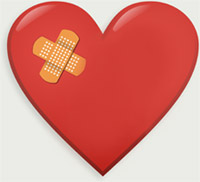Test your knowledge of heart health

Posted in Health Quizes on October 5, 2012. Last modified on April 15, 2020. Read disclaimer.
Summary
One person dies in America every 39 seconds from heart disease. Unfortunately, many instances could have been prevented. To protect your heart health, follow these 7 steps:
- Exercise at least 30 minutes a day, at least 5 days a week
- Don't smoke
- Limit alcohol to no more than one drink per day
- Eat more fruits, vegetables, whole grains and lean proteins with fewer saturated and trans fats.
- Maintain a healthy weight
- Find ways to reduce or eliminate stressors in your life
- Know your numbers: blood pressure, blood glucose (diabetes), cholesterol and triglycerides
To learn more about what you can do to protect your heart, visit:
http://circ.ahajournals.org/content/123/4/e18.full
http://www.cdc.gov/heartdisease/facts.htm
http://womenshealth.gov/heartattack/symptoms.cfm?q=know-the-symptoms
http://www.nhlbi.nih.gov/health/health-topics/topics/hyp/
http://abcnews.go.com/Health/HeartDiseaseRisks/story?id=4218279
http://www.nhlbi.nih.gov/hbp/hbp/whathbp.htm
http://www.drmirkin.com/heart/8025.htm
http://commonhealth.virginia.gov/documents/StressRelief.doc
http://www.nhlbi.nih.gov/health/public/sleep/healthy_sleep.pdf
http://www.womenshealth.gov/publications/our-publications/fact-sheet/heart-disease.cfm#d
http://www.nhlbi.nih.gov/health/public/sleep/healthysleepfs.pdf
http://msdh.ms.gov/msdhsite/_static/resources/3904.pdf
 Test your smarts about aging?
Test your smarts about aging? Take our heart smart mini quiz
Take our heart smart mini quiz Heart health and Vitamin C
Heart health and Vitamin C How to prevent computer strain
How to prevent computer strain Are eggs heart-healthy or harmful?
Are eggs heart-healthy or harmful? Tips for avoiding constipation
Tips for avoiding constipation Ways to support our troops
Ways to support our troops What's YOUR risk of heart disease?
What's YOUR risk of heart disease? 4 Important heart health tests
4 Important heart health tests Healing properties of chamomile tea
Healing properties of chamomile tea Prevent menopausal weight gain
Prevent menopausal weight gain Health dangers of sedentary lifestyle
Health dangers of sedentary lifestyle
